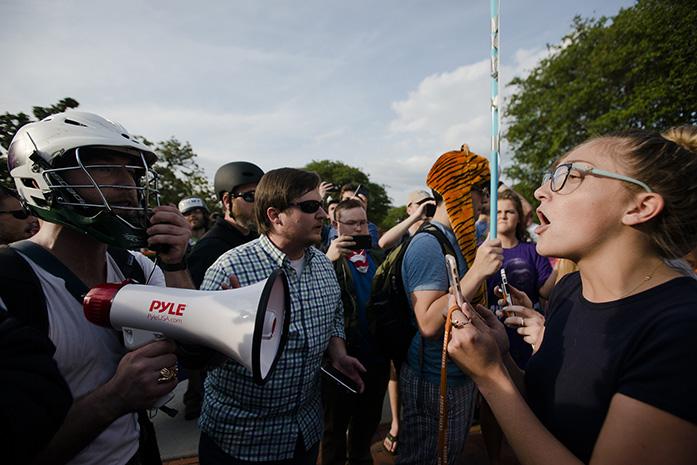Richard Spencer, a leader in the “alt-right movement,” attempts to normalize hate by giving absurd speeches about the alleged validity of white supremacy in America’s past, present, and future.
This past week, Spencer spoke at Auburn University. Prior to his speech, however, protesters swarmed the auditorium. Outside Foy Hall, where Spencer spoke for two hours, three people were arrested as protests turned violent, according to CNN. Inside, CNN reports, countless supporters chanted, “Let him speak” as opponents attempted to silence the white supremacist.
While many may wish the opposite, the reality is that Spencer has the same right to free speech as any other U.S. citizen. In fact, according to Politifact, the First Amendment says nothing about alleged “hate speech.” Politifact adds that free speech only “doesn’t apply to threats, child pornography, and ‘fighting words’ (speech that would likely draw someone into a fight, such as personal insults).”
Yet, the first — and undeniably most important — amendment to the Constitution makes no comment on hate speech. In fact, according to CNN, Spencer makes no mention of violence. He does, however, advocate for the peaceful removal of non-white races from America (as if that sentence even makes any sense in the first place).
Spencer is spreading a terrible message. However, the unfortunate reality is that even his speeches deserve protection under free speech.
It is the duty of journalism to protect and support free speech. But what happens when that free speech is propaganda? In this “post-truth” world, it is also the duty of journalists to prevent the spread of fake news and opinions that are based on falsehoods yet are presented as facts. With Spencer, these two important facets of journalism are at odds.
On the one hand, siding with Spencer is protecting the fundamental right provided to all Americans of free speech. On the other, siding with Spencer is to side with someone with whom the Editorial Board could not possibly disagree with more and allowing the spread of hateful propaganda.
The solution is complicated but necessary.
First and foremost, American history needs to be rewritten. The contributions of individuals with diverse backgrounds have always been diminished by the — often less-impressive — accomplishments of their white counterparts; that is to say, American history has been whitewashed. In order to combat Spencer’s hate speech, the American public must be educated on the realities of American history: Our country may be a great one, but it was built on the backs of slave labor and other such atrocities.
Second, if the United States is to have an open dialogue, it cannot prevent even people as horribly wrong as Spencer from speaking. However, the caveat to this is that speakers such as Spencer who preach a narrative of hate must be followed by an opposing side. If Auburn (or any other institution, for that matter) is to have speakers as divisive as Spencer, then it must also be prepared to provide the audience with fact-checking and opposing sides immediately following.
It’s important to silence hatred like the kind Spencer spews, but the best way to do it is to educate members of the public to an extent that they prevent Spencer from reaching prominence in the first place. The solution is not to fight fire with fire by attempting to literally silence another American citizen, even one as hateful as Spencer.



